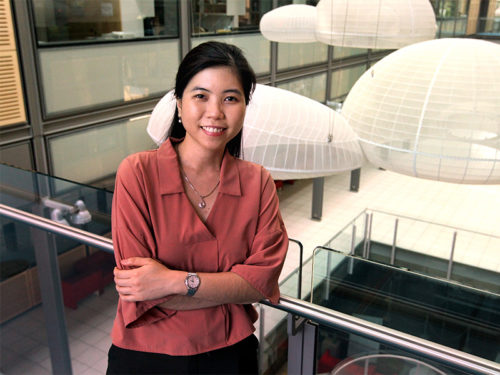By Katie Tam
Suong (Su) Nguyen, a fourth-year graduate student in chemistry, has been named the 2020-2021 Maeder Fellow in Energy and the Environment for her work using light to accelerate the breakdown of biomass to create useful chemicals.
Nguyen’s work focuses on developing light-driven technologies to produce chemicals from biomass in ways that are more energy efficient and environmentally sustainable than current methods. Her advisor, Robert Knowles, professor of chemistry, studies photochemical methods for organic synthesis. Nguyen’s work seeks to break down strings of molecules called polymers. She specifically focuses on lignin, a polymer found in plant stalks. Decomposing the stalks is useful for producing chemicals such as vanillin, used for vanilla flavoring. It also can also be used to create chemicals such as petroleum and polystyrene, which currently rely on fossil fuels for production.
While lignin has been seen as an alternative to fossil fuels in chemical production, the processes now used for its degradation are energy-intensive and typically take place under harsh conditions at high temperatures and pressures. That’s where light comes in. By using light combined with a catalyst, Nguyen has shown that polymers can be broken down in milder conditions, including at lower temperatures, with fewer hazardous waste byproducts. Her work, which helps to show that biomass is a realistic alternative for petroleum products, has been published in ACS Catalysis.

“Finding alternatives to fossil-derived chemicals is desirable. There is a lot of work to be done in reaction development for using and breaking down polymers from biomass and I hope to do that,” said Nguyen.
Nguyen received a B.S. in chemistry from the University of Mississippi in 2017. She took her interest in synthetic organic chemistry to Princeton. With the Maeder Fellowship, Nguyen will continue exploring ways to harness light to breakdown biomass into valuable chemicals. In addition, she says, the fellowship will help boost future applications to larger, national fellowships in energy and the environment.
The fellowship is awarded each year to top graduate students performing research that explores topics related to energy and its environmental context. It is supported by the Paul A. Maeder ’75 fund for Innovation in Energy and the Environment and administered by the Andlinger Center for Energy and the Environment.
This work fits into a broader University effort to understand how light can be used to break down and reorganize molecules to create valuable chemicals and fuels. Bioinspired Light-escalated Chemistry, or BioLEC, is an Energy Frontier Research Center funded by the U.S. Department of Energy and led by Princeton University, on which Knowles is a collaborator. The Andlinger Center advises on the strategic management of BioLEC and provides support for distinguished postdoctoral researchers who work across all BioLEC research groups.